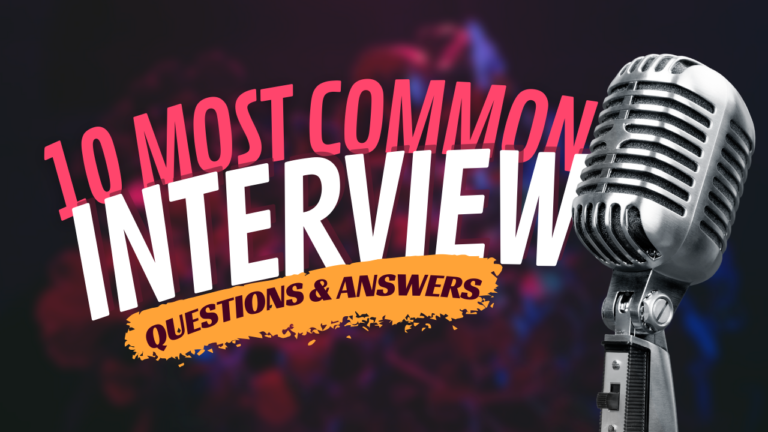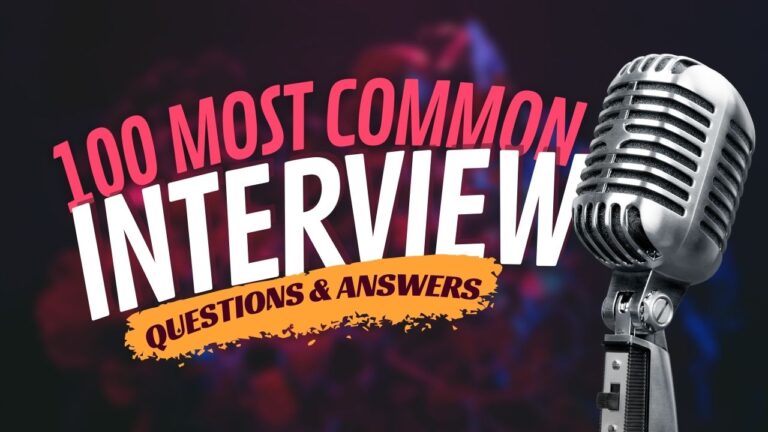110 Interview Questions HSBC Bank: Comprehensive Guide for Candidates

Preparing for an interview at HSBC Bank can be a game-changer for your career. Knowing what questions to expect gives you a huge advantage. This article aims to make you feel confident as you step into your interview.

This post covers a list of expected Questions that may be asked in your Interview. Let’s have a look at 110 Interview Questions for HSBC Interview.
You might face questions that test your skills, experience, and how you work under pressure. Being ready with answers to these questions will help you show your best self. This is not just about getting a job; it is about building a career with a respected institution.
Every job interview has surprises, but being prepared can help you handle whatever comes your way. Explore the questions and tips here to boost your chance of success.
Understanding HSBC and Its Core Values

HSBC is a well-known global bank offering a wide range of banking and financial services. These services include retail banking and wealth management, commercial banking, global banking and markets, and global private banking.
Core Values of HSBC:
- Dependable: You can trust HSBC to act with integrity and prioritize the interests of its clients and communities.
- Open: HSBC values the exchange of ideas, diverse perspectives, and collaboration among its team members.
- Connected: With a network of branches worldwide, HSBC encourages global connectivity for its clients and employees.
Work Culture: HSBC fosters a culture where you are encouraged to take initiative and think innovatively. Employees enjoy a supportive environment that promotes personal and professional growth.
Career Opportunities: A career at HSBC exposes you to global opportunities across its various sectors. Whether you are interested in retail, commercial, or private banking, the diverse range means you have multiple pathways to explore.
The bank values diverse talents and provides training programs to help you gain new skills. This creates an enriching work environment where your development is prioritized. You are empowered to make meaningful contributions.
To sum up, HSBC’s commitment to its core values and global presence offers a rewarding experience for those pursuing a career in banking.
Role and Job Description at HSBC

HSBC offers diverse roles in Global Banking and Markets, Commercial Banking, and Global Private Banking. Each area requires unique skills and expertise, focusing on providing top-quality financial services and solutions. Knowing what each role involves can help you align your skills and career goals with the bank’s objectives.
Global Banking and Markets
In Global Banking and Markets, you can find roles focused on providing investment services and structured finance solutions. Job descriptions include working in areas like equity, fixed income, and advisory services. Positions often require a strong analytical mindset and the ability to work under pressure.
The ideal candidate should excel in quantitative skills and have knowledge of global financial markets. Experience in banking or finance is crucial, and a relevant degree can be beneficial. The ability to communicate complex financial information clearly is also essential.
Focusing on career goals, roles in this department offer opportunities to specialize in financial products and gain exposure to global markets. This can be ideal if you are aiming to advance in investment banking or other high-level financial services roles.
Commercial Banking
Commercial Banking roles emphasize supporting businesses in managing their finances. Job descriptions may involve tasks like loan services, treasury solutions, and client relationship management. You are expected to provide tailored financial solutions to meet diverse business needs.
Ideal candidates are those who have strong interpersonal skills and can build lasting relationships with clients. You should be able to offer insightful financial advice and have a customer-focused mindset. A background in business or finance is often preferred.
When planning your career goals, consider that this area allows you to work closely with various industries. You’ll have the chance to understand the financial challenges businesses face and work on solutions that support their growth.
Global Private Banking
In Global Private Banking, roles center around managing wealth for high-net-worth individuals. Job descriptions may involve personalized investment advice, wealth structuring, and fiduciary services. You need to provide tailored financial solutions while maintaining confidentiality and trust.
As an ideal candidate, you should have exemplary relationship-building skills and a deep understanding of investment strategies. Professionalism and integrity are key, and experience in wealth management is highly beneficial.
Regarding career goals, this sector allows you to gain expertise in managing substantial assets and building long-term client relationships. If you’re interested in providing personalized financial advice to affluent clients, this area offers a rewarding career path.
Preparing for Your HSBC Interview

Getting ready for an HSBC interview involves knowing about the company’s history, financial products, and customer focus. By understanding these key areas, you increase your chances of success.
Research and Background Knowledge
Before your interview, gather information about HSBC’s values, history, and current market position. Know the basics of where and how they operate globally. Key facts include their headquarters location and major markets they serve.
Use resources like HSBC’s official website, annual reports, and recent news articles. Try understanding the bank’s strategic goals and recent business moves. Matching your skills with HSBC’s objectives can make a strong impression.
Online reviews and employee testimonials can also provide insight into the company’s culture. Knowing about corporate initiatives like sustainability efforts will prepare you to address these during your interview.
Understanding Financial Products and Services
HSBC is a significant player in banking, offering a wide range of products. Familiarize yourself with basic financial products like savings accounts, loans, and credit cards. Knowledge of more advanced products, like investments and insurance, can set you apart.
Understand how HSBC integrates technology in its services, like the use of AI and machine learning in banking operations. This knowledge can be crucial for roles that focus on tech in finance. Explore how these innovations improve customer experience and operational efficiency.
Developing a Customer Focus
HSBC values customer service and a strong client focus. Prepare to discuss experiences where you’ve prioritized customer needs or solved customer issues. Highlight effective communication and problem-solving skills in your examples.
Understanding cultural differences and global perspective is key. HSBC serves diverse markets, so being able to relate to different customer backgrounds and needs is important.
Common Interview Questions and How to Answer Them

When preparing for an HSBC Bank USA interview, you’ll encounter various types of questions. Understanding how to address these can help you present yourself confidently and clearly. Below are key areas you’ll need to focus on, with example questions and tips for answering.
Customer Service Questions
In banking, customer service is crucial. You might be asked about your experience or how you’d handle specific situations. Here are some questions:
- Can you describe your previous customer service experience?
- How do you handle a difficult customer?
- What strategies do you use to ensure customer satisfaction?
- Describe a time you went above and beyond for a customer.
- How do you prioritize multiple customers’ needs?
- What does excellent customer service mean to you?
- How do you stay calm under pressure when dealing with customers?
- Can you provide an example of resolving a customer complaint?
- How do you handle receiving negative feedback?
- Why is customer service important in banking?
To answer effectively, highlight your communication skills and specific customer service experience. Use real-life examples to demonstrate your ability to manage complaints and maintain positive relationships.
Problem-Solving Questions
Problem-solving is key in the banking industry. Interviewers will want to assess your ability to find solutions. Possible questions include:
- Describe a challenging problem you faced and how you solved it.
- How do you prioritize multiple tasks when faced with a time constraint?
- Can you give an example of an innovative solution you implemented?
- How do you approach a problem you’re unfamiliar with?
- Describe a time when you had to make a quick decision.
- How do you handle failed solutions?
- What steps do you take to identify the root cause of a problem?
- How do you handle risk management in decision-making?
- Describe a time you had to convince a team to change their approach.
- How do you evaluate success when solving a problem?
Focus on detailing your problem-solving skills with specific examples. Explain your thought process and how you reach a solution, especially in high-pressure scenarios.
Teamwork Questions
In a global bank like HSBC, teamwork is essential. Interviewers often check how you collaborate with colleagues. Relevant questions might include:
- Can you give an example of successful teamwork in a previous role?
- How do you handle disagreements within a team?
- Have you ever had to adapt your work style to fit a team?
- How do you ensure everyone in a team feels included?
- Describe your role in a team project and its outcome.
- What do you do if a team member is not contributing?
- How do you celebrate team success?
- Can you lead a team effectively? Give an example.
- How do you handle working with a difficult teammate?
- What qualities make a team successful?
Showcase your ability to cooperate and communicate with others. Share specific examples where your teamwork led to achieving goals.
Conflict and Diversity Questions
HSBC values diversity and the ability to handle conflict. Be prepared for questions like:
- How do you approach resolving conflicts?
- Describe a time you worked with individuals from diverse backgrounds.
- How do you ensure your work environment is inclusive?
- Can you give an example of how you promoted diversity?
- How do you handle bias or prejudice in the workplace?
- What would you do if you witnessed discrimination?
- Describe a conflict and how you resolved it.
- How have you overcome challenges working with a diverse team?
- What does diversity mean to you in the workplace?
- How do you promote understanding and cooperation among teammates?
Discuss your past experiences with conflict resolution and working in diverse settings. Highlight your ability to nurture a respectful and inclusive workplace.
Education and Experience Questions
Your educational background and work experience are important. They might ask:
- What degree did you earn, and why did you choose it?
- How does your education contribute to your career?
- Describe your most relevant work experience.
- What skills did you gain from your education that apply here?
- How has your previous job prepared you for this role?
- What accomplishment are you most proud of?
- Can you describe a learning experience that changed your approach to work?
- How do you continue to develop professionally?
- What did you learn from your last employment?
- How do your experiences make you a good fit for HSBC?
Detail your qualifications and specific experiences. Tie them back to how they will help you succeed at HSBC, emphasizing education and experience questions.
The HSBC Interview Process

When applying for a position at HSBC Bank USA, you’ll typically go through several steps. These can include submitting your resume and cover letter, a phone screening, and in-person or virtual interviews.
Interview Tips:
- Research: Familiarize yourself with HSBC’s values and news about the company.
- Practice: Prepare responses to common job interview questions.
- Dress Appropriately: Wear professional attire to leave a positive impression.
You can expect questions about your past experiences. For example, be prepared to discuss projects where you showed leadership or teamwork. Use specific examples to highlight your skills and achievements.
Before the interview, ensure your cover letter is tailored to the role. Highlight how your experience and skills make you a strong fit for HSBC.
Remember, confidence is key. Maintain a positive attitude throughout the process, and be ready to show why you are the best candidate for the job.
List of 70 Interview Questions: HSBC Bank

Preparing for an interview at HSBC Bank USA? Here are 70 key questions that could help you get ready:
Be ready to discuss your achievements and how you work in teams. Practice clear communication to express your ideas effectively.
Think about your past experiences and tailor your answers to show suitability for the position.
1. How do you approach financial analysis in your role?
Sample Answer: I approach financial analysis by first gathering relevant data and identifying key performance indicators. I analyze trends and variances to provide actionable insights. For instance, in my previous role, I used financial modeling to forecast revenue, which helped the management team make informed decisions.
2. Can you describe a time when you improved a process?
Sample Answer: At my last job, I noticed that our reporting process was taking too long. I proposed using automation tools to streamline data collection and reporting. After implementing this change, we reduced the reporting time by 50%, allowing the team to focus on analysis rather than data entry.
3. How do you ensure compliance with financial regulations?
Sample Answer: I ensure compliance by staying updated on regulatory changes through continuous education and training. I also conduct regular audits and establish clear protocols within my team to ensure everyone understands and follows compliance requirements.
4. What strategies do you use to build strong client relationships?
Sample Answer: I focus on active listening and understanding clients’ needs. I regularly check in with clients, provide personalized solutions, and follow up to ensure their satisfaction. Building trust through transparency and reliability is key to maintaining long-term relationships.
5. Describe a situation where you had to analyze complex data.
Sample Answer: In my previous role, I was tasked with analyzing customer transaction data to identify spending patterns. I used statistical software to segment the data and discovered trends that informed our marketing strategy, leading to a 20% increase in targeted campaign effectiveness.
6. How do you handle a disagreement with a team member?
Sample Answer: I handle disagreements by addressing the issue directly and respectfully. I encourage open dialogue to understand their perspective and find common ground. If needed, I involve a neutral third party to mediate the discussion and reach a resolution.
7. What is your experience with risk management?
Sample Answer: I have worked on various risk management projects, including assessing credit risk for loan applications. I analyze financial statements and credit histories to determine the risk level and make recommendations to mitigate potential losses.
8. How do you prioritize your work when managing multiple projects?
Sample Answer: I prioritize my work by assessing the urgency and impact of each project. I use project management tools to track deadlines and progress. I focus on high-impact tasks first, ensuring that I allocate time effectively to meet all deadlines.
9. What role does teamwork play in your work ethic?
Sample Answer: Teamwork is essential to my work ethic. I believe that collaboration leads to better outcomes. I actively contribute ideas, support my colleagues, and value diverse perspectives, which fosters a positive and productive work environment.
10. Can you give an example of how you dealt with a challenging client?
Sample Answer: I once worked with a client who was frustrated with delays in service. I took the time to listen to their concerns, provided regular updates on the situation, and offered a solution that addressed their needs. By the end of the process, the client expressed appreciation for my support.
11. How do you stay informed about industry trends?
Sample Answer: I stay informed by subscribing to financial news outlets, attending industry conferences, and participating in webinars. I also engage with professional networks on platforms like LinkedIn to share insights and learn from peers.
12. Describe your experience with budgeting and forecasting.
Sample Answer: I have extensive experience with budgeting and forecasting, having managed departmental budgets in my previous roles. I analyze historical data to make accurate forecasts and collaborate with various teams to ensure alignment with organizational goals.
13. How would you approach a situation where you need to meet a tight deadline?
Sample Answer: I would assess the tasks required to meet the deadline and prioritize them based on urgency. I would communicate with my team to delegate responsibilities and ensure everyone is aligned. Staying organized and focused is key to meeting tight deadlines.
14. What do you consider when evaluating investment opportunities?
Sample Answer: I evaluate investment opportunities by analyzing financial metrics, market conditions, and potential risks. I also consider the alignment with the client’s goals and the overall economic environment to make informed recommendations.
15. How do you handle constructive feedback?
Sample Answer: I view constructive feedback as an opportunity for growth. I listen actively, ask clarifying questions if needed, and reflect on the feedback to identify areas for improvement. I appreciate when others help me develop my skills.
16. Can you describe a successful project you managed?
Sample Answer: I managed a project to launch a new financial product that required cross-departmental collaboration. I developed a project plan, coordinated tasks, and communicated regularly with stakeholders. The product launch exceeded sales targets by 30% in the first quarter.
17. How do you approach market segmentation?
Sample Answer: I approach market segmentation by analyzing customer demographics, behaviors, and preferences. By segmenting the market, I can tailor marketing strategies and product offerings to meet the specific needs of each group, enhancing customer satisfaction.
18. Describe a time when you had to persuade others to accept your idea.
Sample Answer: I proposed a new client onboarding process to streamline operations. I presented data highlighting the potential efficiency gains and addressed concerns from my team. By demonstrating the benefits and involving them in the implementation, I gained their support.
19. What is your understanding of HSBC’s global strategy?
Sample Answer: HSBC’s global strategy focuses on leveraging its international network to serve customers in key markets. The bank aims to provide tailored financial solutions while emphasizing sustainability and responsible banking practices to foster long-term growth.
20. How do you manage stress in a high-pressure environment?
Sample Answer: I manage stress by maintaining a balanced workload and practicing mindfulness techniques. I prioritize self-care, such as regular exercise and taking breaks, to ensure I remain focused and productive under pressure.
21. What do you believe is the most important skill for a banker?
Sample Answer: I believe strong analytical skills are crucial for a banker. The ability to analyze financial data, assess risk, and make informed decisions is essential for providing valuable insights and recommendations to clients.
22. How do you ensure accuracy in your financial reporting?
Sample Answer: I ensure accuracy by double-checking my work and using established procedures for data entry and reporting. I also collaborate with colleagues for peer reviews and utilize software tools to minimize errors.
23. Describe a time when you had to adapt to a significant change.
Sample Answer: When my previous company transitioned to a new software system, I quickly adapted by taking online training courses and helping my colleagues learn the new platform. This proactive approach facilitated a smoother transition for the entire team.
24. How do you approach customer feedback?
Sample Answer: I approach customer feedback as a valuable source of information. I actively seek feedback through surveys and direct communication, analyze the data to identify trends, and implement changes based on customer suggestions to enhance our services.
25. What is your experience with digital banking platforms?
Sample Answer: I have worked with various digital banking platforms, assisting clients with online account management and mobile banking features. I understand the importance of user experience and security in digital banking and strive to educate clients on utilizing these tools effectively.
26. How would you handle a situation where a colleague is not meeting performance expectations?
Sample Answer: I would address the situation by having a private conversation with the colleague to understand any challenges they may be facing. I would offer support and resources to help them improve, and if necessary, involve a supervisor for additional guidance.
27. Describe your experience with sales targets.
Sample Answer: In my previous role, I consistently met and exceeded sales targets by developing strong relationships with clients and understanding their needs. I utilized a consultative selling approach, which allowed me to provide tailored solutions that resonated with clients.
28. How do you approach ethical dilemmas in banking?
Sample Answer: I approach ethical dilemmas by adhering to the bank’s code of conduct and regulatory guidelines. I believe in transparency and integrity, and I would seek guidance from my supervisor or compliance team if I faced an ethical challenge.
29. What strategies do you use for effective communication?
Sample Answer: I use clear and concise language and actively listen to ensure mutual understanding. I tailor my communication style to my audience, whether it’s formal presentations or informal discussions, to foster effective collaboration.
30. How do you assess the financial health of a company?
Sample Answer: I assess a company’s financial health by analyzing key financial statements, including the balance sheet, income statement, and cash flow statement. I look for trends in profitability, liquidity, and solvency to evaluate overall performance.
31. How would you contribute to HSBC’s commitment to diversity and inclusion?
Sample Answer: I would contribute by promoting an inclusive work environment where diverse perspectives are valued. I would actively participate in diversity initiatives, support underrepresented groups, and foster a culture of respect and collaboration.
32. Describe a time when you had to meet a challenging goal.
Sample Answer: I was tasked with increasing client retention rates within a quarter. I developed a client feedback program, implemented personalized follow-ups, and enhanced our service offerings. As a result, we achieved a 15% increase in retention rates.
33. What is your understanding of credit risk assessment?
Sample Answer: Credit risk assessment involves evaluating a borrower’s ability to repay a loan. This includes analyzing credit scores, financial statements, and repayment history to determine the likelihood of default and inform lending decisions.
34. How do you approach strategic planning?
Sample Answer: I approach strategic planning by conducting a SWOT analysis to identify strengths, weaknesses, opportunities, and threats. I collaborate with stakeholders to align objectives and develop actionable plans that drive growth and efficiency.
35. What do you think is the biggest challenge facing the banking industry today?
Sample Answer: One of the biggest challenges is adapting to rapid technological advancements while ensuring cybersecurity. Banks must innovate to meet customer expectations while protecting sensitive information, which requires a balanced approach.
36. How do you handle multiple priorities?
Sample Answer: I handle multiple priorities by creating a detailed to-do list and categorizing tasks by urgency and importance. I set clear deadlines and regularly review my progress to ensure I stay on track without compromising quality.
37. Describe your experience with financial modeling.
Sample Answer: I have experience creating financial models for budgeting and forecasting purposes. I utilize Excel to develop models that project revenue, expenses, and cash flow, allowing management to make informed financial decisions.
38. How do you approach talent development within your team?
Sample Answer: I approach talent development by identifying individual strengths and areas for improvement. I encourage continuous learning through training and mentorship, and I provide opportunities for team members to take on new responsibilities.
39. What role do you think technology plays in enhancing customer experience?
Sample Answer: Technology plays a crucial role in enhancing customer experience by providing convenient access to banking services, personalized recommendations, and efficient communication channels. It allows banks to meet customer needs quickly and effectively.
40. How do you ensure confidentiality in your work?
Sample Answer: I ensure confidentiality by adhering to company policies and regulatory requirements regarding data protection. I limit access to sensitive information and use secure communication channels to maintain privacy.
41. How do you handle a situation where you need to deliver bad news to a client?
Sample Answer: I handle such situations with empathy and transparency. I would prepare for the conversation by understanding the reasons behind the bad news and presenting it clearly, while also offering potential solutions or alternatives to mitigate the impact.
42. Describe a time when you had to learn a new technology quickly.
Sample Answer: When my previous company adopted a new CRM system, I took the initiative to learn its functionalities through online resources. I quickly became proficient and assisted my colleagues in adapting to the new system, which facilitated a smoother transition.
43. What is your experience with cross-selling financial products?
Sample Answer: I have successfully cross-sold financial products by understanding clients’ needs and identifying complementary services. By building strong relationships and demonstrating the value of additional products, I was able to increase overall sales.
44. How do you approach performance evaluations?
Sample Answer: I approach performance evaluations by setting clear, measurable goals at the beginning of the review period. I provide regular feedback and support throughout the year, and I conduct evaluations that focus on strengths, areas for improvement, and development opportunities.
45. What do you believe is the key to successful project management?
Sample Answer: The key to successful project management is effective communication and collaboration. Establishing clear objectives, timelines, and roles ensures everyone is aligned, while regular check-ins help address challenges proactively.
46. How do you assess the effectiveness of a marketing campaign?
Sample Answer: I assess the effectiveness of a marketing campaign by analyzing key performance indicators such as conversion rates, customer engagement, and return on investment. I also gather feedback from clients to understand their perceptions and experiences.
47. Describe your experience with client onboarding processes.
Sample Answer: I have managed client onboarding processes by developing streamlined procedures that enhance the client experience. I ensure that all necessary documentation is collected efficiently and provide clear communication throughout the onboarding journey.
48. How do you stay motivated during challenging projects?
Sample Answer: I stay motivated by focusing on the end goal and reminding myself of the positive impact the project will have. I break down the project into smaller milestones and celebrate achievements along the way to maintain momentum.
49. What is your understanding of anti-money laundering (AML) practices?
Sample Answer: Anti-money laundering (AML) practices involve implementing policies and procedures to detect and prevent money laundering activities. This includes customer due diligence, transaction monitoring, and reporting suspicious activities to regulatory authorities.
50. How do you approach negotiation in a business context?
Sample Answer: I approach negotiation by preparing thoroughly and understanding both parties’ needs. I aim for a win-win outcome by being open to compromise while advocating for my objectives. Building rapport and trust is essential.
51. How do you handle changes in regulatory requirements?
Sample Answer: I handle changes in regulatory requirements by staying informed through continuous education and training. I regularly review updates from regulatory bodies and adjust our internal processes accordingly to ensure compliance.
52. Describe a time when you had to make a decision with incomplete information.
Sample Answer: In a previous role, I had to decide whether to approve a loan application with limited financial history. I assessed the applicant’s credit score and existing obligations, consulted with colleagues, and ultimately decided to approve it with a lower limit, which mitigated risk.
53. What tools or software do you find most effective for financial analysis?
Sample Answer: I find tools like Excel and financial modeling software to be very effective for financial analysis. Excel allows for detailed data manipulation and analysis, while specialized software can streamline complex modeling processes and enhance accuracy.
54. How do you approach mentoring junior team members?
Sample Answer: I approach mentoring by establishing a supportive relationship where junior team members feel comfortable asking questions. I provide them with constructive feedback, share my experiences, and encourage them to take on challenging tasks to build their confidence.
55. What strategies do you use to manage client expectations?
Sample Answer: I manage client expectations by setting clear, realistic timelines and being transparent about potential challenges. I regularly communicate progress updates and make sure clients understand the processes involved, which helps build trust.
56. How do you evaluate the success of a financial product?
Sample Answer: I evaluate the success of a financial product by analyzing key metrics such as sales volume, customer feedback, and market share. I also monitor retention rates and profitability to assess overall performance and identify areas for improvement.
57. Describe a time when you had to work with a diverse team.
Sample Answer: I worked on a project with a diverse team from different cultural backgrounds. I encouraged open dialogue and made an effort to understand each member’s perspective. This diversity led to innovative solutions and a successful project outcome.
58. How do you approach conflict resolution in the workplace?
Sample Answer: I approach conflict resolution by first listening to all parties involved to understand their perspectives. I facilitate a discussion to find common ground and work collaboratively towards a solution that satisfies everyone.
59. What do you consider when developing a marketing strategy for a financial product?
Sample Answer: When developing a marketing strategy, I consider the target audience, market trends, competitive analysis, and the unique selling points of the product. I also focus on channels that effectively reach the audience and measure success through KPIs.
60. How do you ensure effective communication within your team?
Sample Answer: I ensure effective communication by establishing regular check-ins and using collaboration tools to share updates and documents. I encourage an open-door policy where team members feel comfortable sharing ideas and concerns.
61. What is your experience with customer relationship management (CRM) systems?
Sample Answer: I have extensive experience using CRM systems to track customer interactions, manage leads, and analyze customer data. This has helped me build stronger relationships and tailor my approach based on individual client needs.
62. How do you assess the competitive landscape in banking?
Sample Answer: I assess the competitive landscape by analyzing competitors’ products, pricing, and market positioning. I also gather customer feedback and industry reports to identify trends and gaps that can inform our strategic decisions.
63. Describe your experience with loan underwriting.
Sample Answer: I have experience in loan underwriting, where I evaluate creditworthiness by analyzing financial statements, credit reports, and risk factors. I ensure that all underwriting decisions align with regulatory guidelines and the bank’s risk appetite.
64. How do you support organizational change?
Sample Answer: I support organizational change by being an advocate for the process and communicating its benefits to my colleagues. I provide training and resources to help them adapt and encourage feedback to make the transition smoother.
65. What is your approach to handling sensitive client information?
Sample Answer: I handle sensitive client information with the utmost confidentiality. I follow established protocols for data protection and ensure that only authorized personnel have access to sensitive information.
66. How do you evaluate and manage vendor relationships?
Sample Answer: I evaluate vendor relationships by assessing their performance against agreed-upon metrics and conducting regular reviews. I maintain open communication to address any issues and ensure that the partnership aligns with our organizational goals.
67. Describe a time when you had to influence a key decision-maker.
Sample Answer: I influenced a key decision-maker by presenting data-driven insights on a proposed investment strategy. I highlighted potential risks and rewards, which ultimately swayed their decision to proceed with the strategy I recommended.
68. How do you approach personal development in your career?
Sample Answer: I approach personal development by setting specific, measurable goals for my skills and knowledge. I seek out training opportunities, attend workshops, and actively seek feedback from mentors to continuously improve.
69. What do you believe is the future of banking?
Sample Answer: I believe the future of banking will be heavily influenced by technology, with digital banking becoming the norm. We will see increased use of AI and machine learning for personalized services, along with a greater emphasis on sustainability and ethical practices.
70. How do you balance short-term goals with long-term objectives?
Sample Answer: I balance short-term goals with long-term objectives by aligning daily tasks with the overall strategic vision. I prioritize initiatives that contribute to both immediate results and sustainable growth, regularly reviewing progress to ensure alignment.
These questions can boost your confidence and help you convey your competencies effectively during the interview.
Frequently Asked Questions: HSBC Bank Interview

When interviewing at HSBC Bank USA, you’ll encounter diverse questions that assess your problem-solving skills, knowledge about the company, and ability to apply financial regulations. Understanding your potential contributions to the team is also key.
How would you handle a challenging customer service scenario?
Approach a challenging customer service situation with empathy and active listening. First, ensure you understand the customer’s concern fully.
Then, find a solution that aligns with HSBC’s policies and delights the customer. Your goal is to solve the problem efficiently while maintaining a positive relationship.
What can you tell me about HSBC’s history and values?
HSBC has a rich history dating back to 1865. It emphasizes financial stability and customer service across the globe.
The bank values integrity, diversity, and being dependably open. Understanding these core values helps you align your work with the bank’s mission.
What are your strengths and weaknesses when it comes to financial analysis?
Identify specific strengths, like attention to detail or proficiency in financial modeling, that demonstrate your competency in financial analysis.
Acknowledge any weaknesses honestly, explaining how you are working to improve those areas. This reveals your awareness and commitment to personal growth.
Can you describe a situation where you had to overcome a significant challenge?
Share a relevant experience where you faced a tough challenge. Explain the situation, your actions, and the outcome.
Highlight the skills you used to overcome the obstacle, such as teamwork or problem-solving, and how this experience prepared you for future challenges.
How do you stay updated with current financial regulations and apply them in a banking environment?
Stay informed about financial regulations through reputable sources, like industry publications or training seminars. Discuss how you apply this knowledge in practice.
Show that you can balance following regulations with achieving business goals, ensuring compliance without compromising service quality.
In what ways would you contribute to our team here at HSBC?
Think about the unique skills and experiences you could bring to HSBC. This might include specific expertise in banking processes or leadership skills.
Use examples from your past roles to demonstrate your ability to add value to the team and support HSBC’s objectives.
All the Best !






